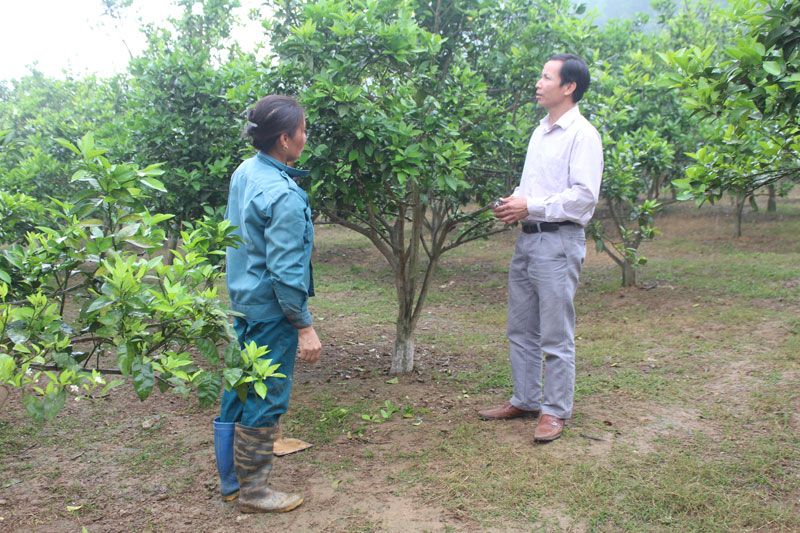
(HBO) – Hoa Binh has adopted various policies over recent years to develop products which the province has competitive edges of, in response to a national agricultural restructuring project which seeks to increase added value for the agriculture and foster sustainable development and new-style rural building.
The province
has formulated and amended nine agricultural restructuring plans and issued 25
others for the development of specific sectors, sub-sectors and products in a
bid to foster the comprehesive growth of the agriculture, expand added-value
and respond to climate change.
 Villagers in Phu Thanh commune, Lac Thuy
district shift to safe orange farming in response to agriculture restructuring policy.
Villagers in Phu Thanh commune, Lac Thuy
district shift to safe orange farming in response to agriculture restructuring policy.
Particularly,
the province has given priority to the cultivation of citrus fruits, clean vegetables and sugarcanes. It is now home to 10,500 hectares of citrus
fruits, including over 6,600 hectares as commercial farming which can generate
up to 120,000 tonnes.
A total of 14
farms in the province, with a combined of about 271 hectares, have met food safety standards and been qualified
for organic and VietGAP production.
Between 2017
and 2019, over 7,000 hectares of low-yielding rice and crops have been
transformed into the land for the cultivation of other crops with higher productivity.
There is an
increasing number of large-scale livestock farms raising high-yielding amimals
which use advanced farming techniques and disaster-free practice.
The province
has focused on intensive farming of cattle, pig, poultry and goat. By the end of this year’s first
quarter, the province has had 129 farms, including 41 for pig farming, 71 for
poultry, 14 for goat, and three for cow.
The province
has expanded areas of hardwood and indigenous trees as part of its plan to restructure forestry
sector while shifting to thefarming of high-value fishery varieties./.
Hoa Binh province is undergoing a dynamic transformation amid Vietnam’s national digital transition. Building on Poliburo’s Resolution No. 57-NQ/TW on breakthroughs in science, technology, innovation, and national digital transformation, the province has rolled out a wide range of practical action plans. A standout initiative is the "Digital Literacy for All” movement, an effort to ensure that no one is left behind in the digital era.
Hoa Binh province is undergoing a dynamic transformation in the wake of the national digital transformation movement. Building on Resolution No. 57-NQ/TW of the Politburo on breakthroughs in science, technology, innovation, and national digital transformation, the province has implemented a wide range of practical action plans. A standout initiative is the "Digital Literacy for All” movement ambitious effort to ensure that no one is left behind in the digital age.
With a spirit of unity and proactive problem-solving, the Party Committee, the government and the people of Dong Lai Commune (Tan Lac District) have made great strides in implementing the resolutions of the 24th Party Congress of the commune for the 2020 - 2025 term. Focusing on leadership and practical actions, the commune has brought the Party’s resolutions into daily life, creating strong impacts and pushing the local development forward.
Amid the nationwide push for digital transformation, young people in Hoa Binh Province are stepping up as dynamic pioneers, applying technology to enhance Youth Union operations and expand the reach of youth-led initiatives. Through creativity and adaptability, Youth Union organizations at all levels have introduced a series of practical solutions, contributing to modern governance and community development.
In recent years, An Nghia commune, located in Lac Son district, has stepped up administrative reform, focusing on improving the quality and efficiency of its single-window service unit for receiving and processing administrative procedures. These improvements have helped create favourable conditions for local residents and organisations to handle administrative procedures, contributing to the commune’s broader socio-economic development.
The Prime Minister-approved master plan to develop the multi-use value of forests ecosystems through 2030, with a vision to 2050, aims to improve the management and sustainable use of forest resources, create jobs, increase incomes, and improve the living standards of ethnic minorities, people in mountainous and remote areas, forest workers and those living near forests.



 Villagers in Phu Thanh commune, Lac Thuy
district shift to safe orange farming in response to agriculture restructuring policy.
Villagers in Phu Thanh commune, Lac Thuy
district shift to safe orange farming in response to agriculture restructuring policy.